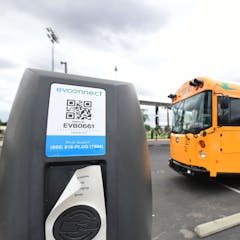
Articles on Back to school
Displaying 21 - 40 of 93 articles

Parents and caregivers are vital partners in education, and together, educators and families can ease back-to-school jitters and help make this an exciting and positive transition for children.

Family routines can provide stability during times of stress. Here are four strategies for building resilience against stress and family challenges to put into place as children head back to school.

Managing a chronic health condition can make the transition to post-secondary education more complex.

Research by geographers in Canada, the United States and Hong Kong identifies lessons for universities and colleges from the 2020 move to online learning.

They look like conventional school buses, but electric versions are cleaner, quieter and cheaper to maintain. States, utilities and federal agencies are helping school districts make the switch.

Year-round academic and extracurricular opportunities that encourage cultural exchange between international students, their peers and the wider society are important.

Canada has much to learn from other countries about better ways of providing learning and care for children.

Inflation is soaring, but prices for typical back-to-school gear like backpacks, computers and new clothes are rising less than average – or even falling.

Universities can support mature students by addressing stigma and ageism, creating a sense of community and adapting programs to suit their multiple roles.

The transition to a new school year will be an important time for students to focus on strategies for fostering positive mental health and well-being, and recognizing signs that help may be needed.

Universities can draw on health research about patient/health-care practitioner shared decision-making to centre the voices of BIPOC students when creating policies and practices to dismantle racism.

Students in an international survey said they really missed chances to be together in person for campus-related activities, not only due to academic concerns.

Starting college after finishing high school is an exciting phase of a student’s life. But students need to prepare for the new challenges college brings.

Researchers studying ways to foster children’s inclusion in society worked with teachers to adapt classroom practices, like dedicated dialogue circles, to online learning.

It doesn’t need to be scary or painful. With the right technique, you’ll be able to perform this test quickly and safely at home.

Many children will thrive on return to school. Others may need a bit more support to adjust to this big change in their lives and manage any anxieties they might have.

Children missed being with friends but liked the freedom to move around at home. These are some of the takeaways from an education researcher who talked to 30 kids ages 5-8.

Plus, new research into what happens in our brains when we daydream. Listen to The Conversation Weekly podcast.

A successful transition in September is a whole-family affair.

Parents often think about a school’s quality, class sizes, safety and extracurriculars. LGBTQ parents may also want to know their family will be respected.
